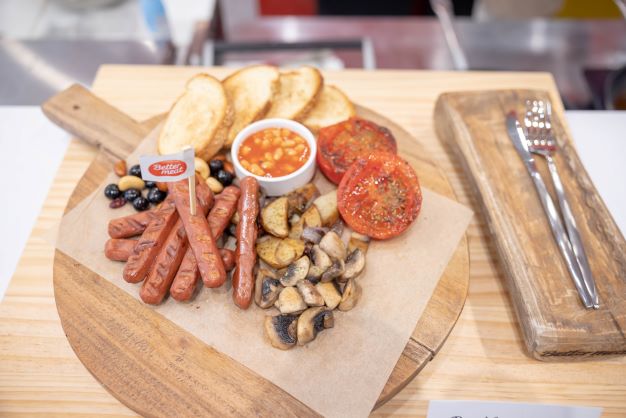Plant-based milk, meat, cheese, yogurt, and frozen meal categories have seen dramatic sales increases, according to a report conducted in partnership with the Plant Based Foods Association and Kroger, supported by the retailer’s 84.51 data science company. The findings were presented Thursday during the Plant Based World Expo North America in New York
During the session titled “Understanding the Consumer Shift from Animal to Plant-Based” Meghan Barton, category manager at Kroger, and Kate Holmstrom, director of business acceleration consulting at 84.51, spoke about plant-based food consumers and their shopping behavior. Julie Emmett, senior director of marketplace development at the Plant Based Foods Association, facilitated discussions by targeting crucial insights from the data.
The research targeted two types of households: plant-based consumers who have decreased their plant-based shopping behavior and those who have increased it, labeled “decreasers” and “increasers,” respectively. Ninety-five percent of respondents cited maintaining or increasing their consumption of plant-based foods. For Barton, this means that plant-based awareness is important. She believes the data also speaks to a plant-based future.
In a conversation about the way customers are being introduced to plant-based products, Barton explained, “Milk is an entry point. What is true about plant-based milk, however, is not true of other categories,” she said, noting that plant-based milks have cleaner ingredients, it is easy to swap the alternatives into existing diets, there are more developed flavors and options, and its place as a replacement for lactose, a top allergen.
“We are expecting the development [of plant-based meat] to mirror plant-based milk over time,” she said. “Plant-based chicken, for example, has opened as an entry point within plant-based meat,” she continued, touting similar benefits to milk.
Holmstrom posited that an interesting effect endemic to plant-based milk, which is not true of other categories, is that 43 percent of consumers are leaving animal products in place of the alternative. For other categories, incremental change reigns supreme, a fact that Barton reinforced.
To best capture households through incremental change, understanding the top motivators for consuming plant-based is needed. The research found the following: health is the top concern, followed by environmental reasons (like sustainability), then animal welfare. Barton broke down the second piece of the puzzle: how consumers shop for plant-based, into three categories:
• Promotion: targeting offers at an accessible price point
• Inspiration: customers are telling Kroger they want more recipes in the aisle; innovation could mean that the company needs to be better at normalizing substitutions at the ingredient level, where plant-based items can be easily swapped into everyday meals
• Navigation: making it easy for shoppers to see plant-based foods around the store and online
Emmett asked both panelists why some consumers are decreasing their plant-based consumption. Dissatisfaction with taste and texture were noted, as well as the high price points that have been exacerbated by inflation. Both Barton and Holmstrom indicated that the plant-based shopper is more responsive to innovation. Holmstrom said that the general pathos of a plant-based shopper is “don’t bore me with plant-based options.”
The three agreed that the future of plant-based is optimistic, and understanding the customer, and meeting them “where they are at” by targeting their needs and wants will be crucial to ensuring a brand’s, and retailer’s success in the category.
Related: Digital Groceries Sales Grow; abillion Releases World’s 10 Best Vegan Burger List
Image: Plant Based World Expo

